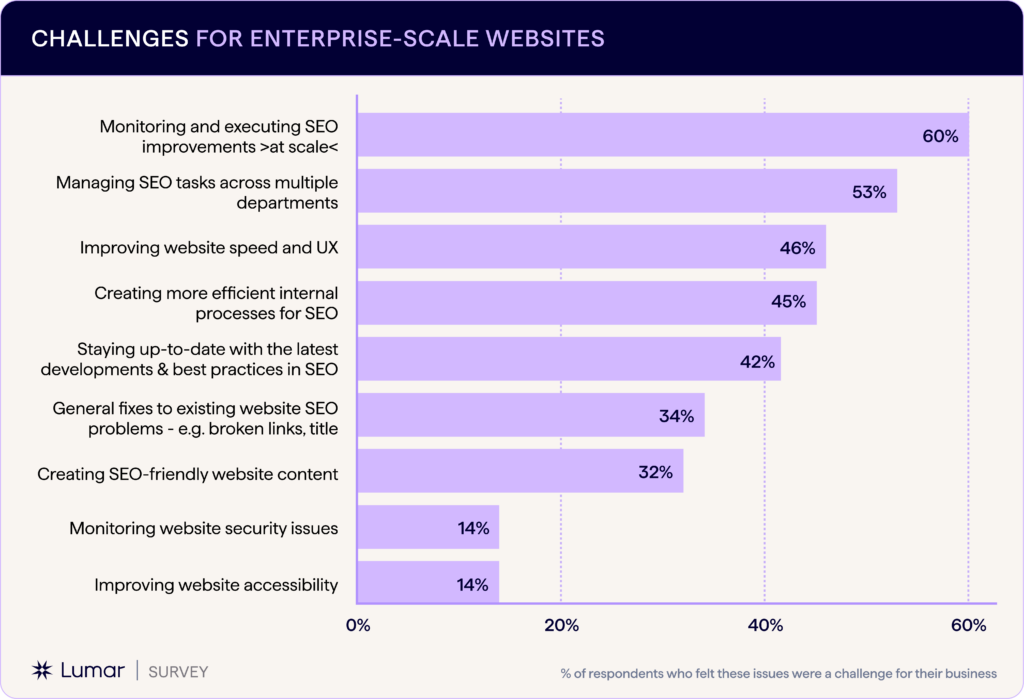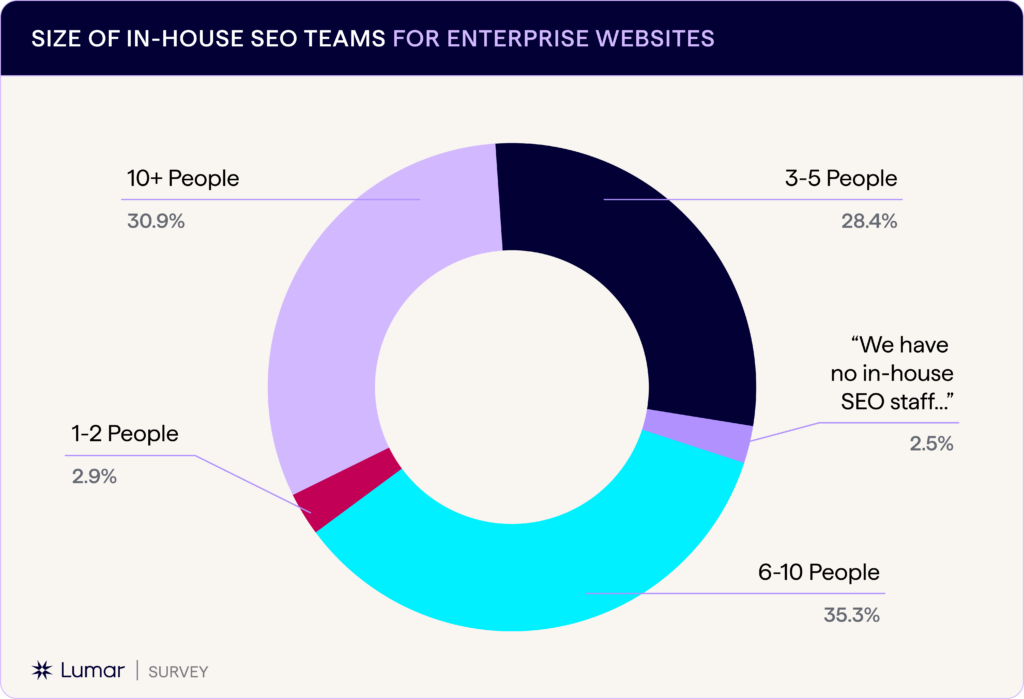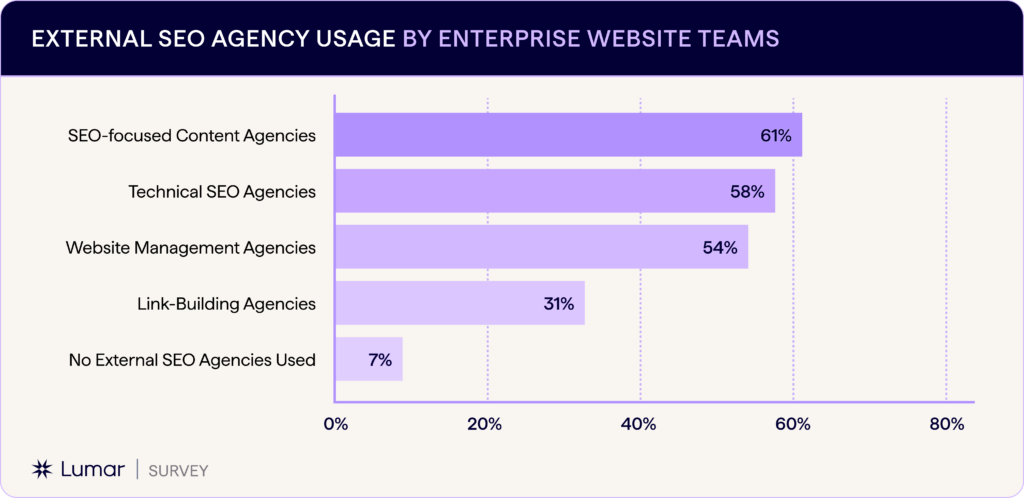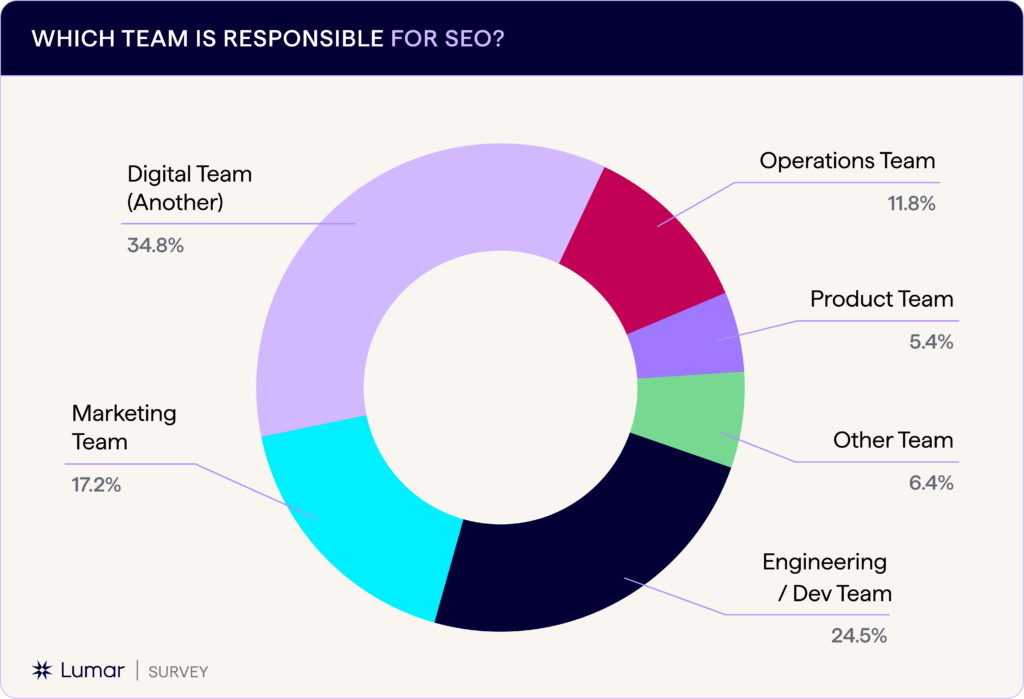Lumar surveyed 200+ marketing, engineering, and other digital leaders working on large-scale websites (sites with 10,000 or more URLs) to learn more about how they manage SEO and website health.
Here’s what we found:
What are the biggest challenges for enterprise-scale websites?
We asked 204 digital leaders whose business websites surpassed 10,000 URLs what their most pressing SEO and website health issues were. The top two issues for enterprise websites were executing SEO changes at scale across their very large sites and managing SEO responsibilities across multiple departments within their organizations.
Here’s the full breakdown of enterprise SEO challenges:

- 60% struggled with executing SEO improvements and monitoring at scale across a large website
- 53% struggled with managing SEO tasks across multiple departments
- 46% struggled with improving website speed and UX
- 45% struggled with creating more efficient internal processes for SEO
- 42% struggled with staying up-to-date with the latest developments and best practices in SEO
- 34% struggled with general fixes to existing website SEO problems – for example: broken links, title tags, sitemap updates, etc.
- 32% struggled with creating SEO-friendly website content
- 14% struggled with monitoring website security issues
- 14% struggled with improving website accessibility
Note: If your own team is struggling to monitor a large site and execute SEO at an enterprise scale, you may want to consider the tools in your tech stack. Some SEO and website intelligence tools work great on smaller-scale websites but fall short at an enterprise level due to slow crawl speeds, limited reporting and customization options, or limited platform integrations.
Lumar’s own website crawler, the foundation of our wider website intelligence platform, was built specifically to handle large-scale sites, offering crawl speeds of up to 450 URLs / second for non-rendered content and 350 URLs / second for rendered content — that’s fast!
For those looking to improve their cross-team website efforts, you may want to consider taking a comprehensive Digital Ops approach for better collaboration.
66% of enterprise-scale digital teams employ 6 or more in-house SEOs
For businesses with large websites, 66% of respondents reported that they employed at least 6 in-house employees who worked on SEO.
Here’s the full breakdown of the in-house enterprise SEO team sizes across respondents:

- 35% had SEO teams comprised of 6-10 people.
- 31% had SEO teams comprised of 10+ people.
- 28% had SEO teams comprised of 3-4 people.
- 3% had SEO teams comprised of just 1-2 people.
- Only 2% of respondents had no dedicated team member in-house who worked on SEO.
Learn more about what resources you’ll need to execute a strong SEO strategy:
The vast majority of businesses with enterprise websites engage at least 1 external agency relating to their website or SEO.
93% of survey respondents who work on very large websites said they use at least one website- or SEO-related agency.
Which types of external agencies are enterprise website teams employing to bolster their in-house resources? Here’s the breakdown:

- SEO-Focused Content Agencies: Used by 61% of respondents
- Technical SEO Agencies: Used by 58% of respondents
- Website Management Agencies: Used by 54% of respondents
- Link-Building Agencies; Used by 31% of respondents
- No external SEO Agencies Used: 7% of respondents
Who is responsible for SEO on enterprise websites?
Interestingly, marketing and engineering leaders often cited their own department as the team responsible for SEO on their large-scale websites.
- 78% of Marketing Leaders said Marketing owns SEO at their company
- 72% of Development Leaders said Engineering owns SEO at their company
- 45% of ‘Other’ Leaders said another Digital team owns SEO at their company
Combined responses (across all segments/roles):

- 35% of all respondents said a separate ‘Digital’ team (not marketing, engineering, or ops) owns SEO at their company
- 25% of all respondents said ‘Engineering’ owns SEO at their company
- 17% of all respondents said ‘Marketing’ owns SEO at their company
- 12% of all respondents said ‘Operations’ owns SEO at their company
- 5% of all respondents said ‘Product’ owns SEO at their company
- 6% of all respondents said ‘Other’ owns SEO at their company
The website intelligence tech stack features most desired by enterprise website teams
Four platform features stood out as the most highly desired by enterprise website teams, by virtue of their appearing most frequently in respondents’ “top 3 desired features” lists.
The features that ranked most often among respondents’ top 3 desired tech stack tools:
- Website Performance Analytics (39% ranked this in their top 3 desired features)
- Website Security Analytics (38% ranked this in their top 3 desired features)
- (tie) SEO Analytics (37% ranked this in their top 3 desired features)
- (tie) Actionable Insights (37% ranked this in their top 3 desired features)
And appearing in the respondents’ number 1 spot, the website intelligence features with the most ‘number 1’ votes were:
- SEO Analytics (17% of respondents said this was the most important feature to have)
- Expert Guidance / Customized Advice (14% said this was the most important feature to have)
- (tie) Website Security Analytics (13% said this was the most important feature)
- (tie) Business Impact Dashboard (13% said this was the most important feature)
Looking for an enterprise SEO solution?
Explore Lumar’s website intelligence & technical SEO platform — built for enterprise-scale websites.






